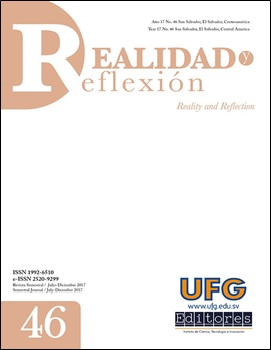Redes sociales como componentes educativos en los entornos digitales de aprendizaje
DOI:
https://doi.org/10.5377/ryr.v0i46.5506Palabras clave:
Redes sociales, aprendizaje, entorno personal de aprendizaje, entorno personal de aprendizaje mediado por la institución.Resumen
El presente artículo es una intelección académica, en el cual se aborda el estudio de las redes sociales como objeto de estudio la construcción (elemento epistémico) y desarrollo (elemento pedagógico didáctico) de aprendizajes significativos en Entornos Digitales de Aprendizaje. Esto permitirá crear un marco de aproximación epistemológica en el cual las redes tecnológicas de comunicación puedan percibirse como una herramienta que permite el aprendizaje colaborativo e involucra espacios de intercambio de información que fomentan la cooperación y significatividad de las redes sociales en la formación académica de los estudiantes y su proceso educativo.
Realidad y Reflexión Año 17, No 46, Julio-Diciembre 2017; 34-53
Descargas
1435
Descargas
Publicado
Cómo citar
Número
Sección
Licencia
© Universidad Francisco Gavidia (UFG)
Política de acceso abierto y derechos de autor
- El contenido y opiniones vertidas en cada contribución son responsabilidad de sus autores. Los autores ceden los derechos de edición y publicación, en versión impresa y digital, a la Universidad Francisco Gavidia.
- La revista Realidad y Reflexión es alojada en las plataformas institucionales de difusión, así como en bases de datos y otras páginas de divulgación científica.
- Las publicaciones de la Universidad Francisco Gavidia se acogen a la normativa salvadoreña de derechos de autor, contemplada en la Ley de Propiedad Intelectual https://wipolex-res.wipo.int/edocs/lexdocs/laws/es/sv/sv001es.pdf
- UFG Editores no realiza ningún cobro por postular, procesar, publicar o acceder a los aportes publicados; los miembros del Consejo Editorial y quienes conformen el Comité Científico en los número monográficos ejercen sus funciones con carácter Ad honorem.
- La revista Realidad y Reflexión opera bajo la modalidad de acceso abierto, a fin de agilizar la transferencia del conocimiento, disminuir la brecha de acceso a la información, incrementar la visibilidad, y, por lo tanto, la difusión de los aportes publicados.
- La revista declara su compromiso con el acceso abierto en la modalidad diamante, lo que significa que los lectores pueden acceder a todos los contenidos de manera gratuita y sin restricciones, y que los autores no deben asumir ningún costo de publicación o procesamiento de sus documentos.
- Las contribuciones pueden ser descargadas, utilizadas y distribuidas, atendiendo las condiciones de la licencia Creative Commons https://creativecommons.org/licenses/by-nc-sa/4.0/

